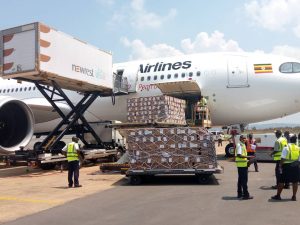Blue Dart Express has collaborated with the Swades Foundation to revitalize Safed Musli cultivation in Nashik as part of its Corporate Social Responsibility (CSR). This joint initiative has significantly enhanced farmer incomes and provided an innovative solution for crop diversification. Safed Musli (Chlorophytum borivilianum), a high-value tuber crop renowned for its medicinal properties, such as enhancing vitality, boosting immunity, and addressing gynecological disorders, had been critically endangered due to unsustainable collection and habitat loss. The tropical climate and altitude of Surgana taluka in Nashik create an ideal environment for cultivating this valuable herb. However, the high cost of planting material had deterred widespread cultivation. Swades Foundation, a grassroots organization dedicated to rural empowerment, partnered with Blue Dart in FY’23-24 to conduct a pilot program involving 82 households in Nashik, each cultivating Safed Musli on 5 gunthas (5,000 sq feet) of land. Through comprehensive training and support from Swades, farmers were introduced to Safed Musli cultivation, provided with high-quality planting material, and guided throughout the crop cycle to the post-harvest stage. The results were remarkable, with farmers achieving a yield valued at Rs. 1,200 per kilogram, leading to an income of Rs. 28,575 per household.
Read More »CSafe launches Silverpod pallets for cold chain operations
CSafe, a provider of a range of thermal shipping solutions for the pharmaceutical cold chain, has launched a new model of its Silverpod pallet shipper that is designed to help users save on disposal costs and improve environmental sustainability. The Silverpod MAX RE, based on CSafe’s single-use Silverpod MAX passive pallet shipper, is made of reusable components. Its maker claims the product offers more than 120 hours of thermal protection. It is made from durable exterior panels with extended edge and corner cap protection so that it can be used many times. The shipper is supplied via a rental model in which CSafe fully manages the life cycle and return of the product. The pallet shipper is supplied flat-packed for delivery, storage and assembly.
Read More »Asia Pacific Airfreight grows by 16.4% YoY:AAPA
Preliminary June 2024 traffic figures released by the Association of Asia Pacific Airlines (AAPA) show that there was strong demand for international air cargo capacity in the region in June. Overall, Asia Pacific airlines recorded a 16.4% year-on-year increase in international air cargo demand – as measured in freight tonne kilometres (FTK) flown – in the month. After accounting for a 12.6% growth in offered freight capacity, the average international freight load factor climbed by 2 percentage points to an average of 62.8% for the month. AAPA pointed to a pick-up in manufacturing activity across the Asian economies, including those of China and India, as being in good part responsible for the healthy year-on-year improvement in demand. Rising e-commerce trade and security concerns in the Red Sea also spurred the need for airfreight capacity.
Read More »‘Global cargo industry surprised at IATA’s response on DG Certification’
Glyn Hughes, Director General, TIACA said, “Some TIACA members have expressed surprise at the answer given by IATA as to why they are refusing to accept certificates of DG training without an accompanying letter from the training school that issued them. Firstly, IATA states that over the years it has received fraudulent DG training certificates across the world, considering the serious ramifications of such fraudulent submissions, has this issue been brought up with FIATA through the IFCC? Also, as Agents who submit fraudulent certificates are breaking national laws and pose a serious safety risk to the industry, has IATA reported these to the national authorities so legal action could be taken? Have they terminated their IATA agency status? We checked with several authorities and industry contacts and cannot identify such terminations. Perhaps IATA can confirm how many fraudulent certificates and in which jurisdictions and what action was taken. Secondly, if an organization has shown no respect for the rules or laws by submitting fraudulent certificates, then why would IATA not think that they would also produce a fraudulent letter from the named training school. And thirdly, IATA refers to changed accreditation rules applicable from July 1, 2024. Have the rules been changed for every country or just India? Does this mean IATA has changed the applicable Agency Resolutions, which are the rules which govern the accreditation criteria and process? Or is it an IATA process that has changed? Surely if IATA is concerned about the validity of certificates provided to them, and they want to tackle the safety risk most effectively, then they should establish a checking mechanism which doesn’t involve the party submitting the certificate. They could check with the …
Read More »BLR Airport ships 822MT of mangoes, records 20% YoY growth
Kempegowda International Airport Bengaluru (KIAB/BLR Airport) successfully concluded another exceptional mango export season, solidifying its reputation as a key player in the agricultural export industry. BLR Airport shipped a staggering 822 Metric Tonnes (MT) of mangoes in 2024, marking a phenomenal 20% year-on-year growth. Building on the momentum from the previous year when 685 MT of mangoes were exported, this season’s success is further accentuated by the substantial increase in the number of mangoes shipped, totalling 27 lakh pieces. This milestone represents a 59% rise in volume compared to the previous season, showcasing both the increasing demand for Indian mangoes in overseas markets and BLR Airport’s operational efficiency in handling perishable exports. This season, mango exports to US destinations have surged, with airports such as Washington Dulles (IAD), Dallas–Fort Worth (DFW), and San Francisco (SFO) emerging as the top destinations for Indian mango shipments. With an extensive export network of over 60 international destinations, including prominent airports like Chicago (ORD), Seattle (SEA), Dubai (DXB), London (LHR), and Houston (IAH), BLR Airport continues to pave the way for Indian agricultural products to reach global markets seamlessly and efficiently. Satyaki Raghunath, the Chief Operating Officer at Bangalore International Airport Ltd (BIAL), said, “BLR Airport’s technologically advanced cold storage facility WFS BLR Coolport plays a crucial role in preserving the quality of the perishable produce throughout the supply chain. This achievement of substantially increasing our mango exports year-on-year reaffirms our position as a premier gateway that meets the growing demand for Indian mangoes, particularly two key international destinations.”
Read More »DP World enables sustainable ops at its Nhava Sheva terminals
DP World has successfully executed the open access sourcing of green power at its Nhava Sheva terminals, Nhava Sheva International Container Terminal (NSICT) and Nhava Sheva India Gateway Terminal (NSIGT), starting from July 1, 2024. Electricity generated remotely is integrated into the state grid, supplying power to NSICT and NSIGT. The open access sourcing of green power initiative, with a cumulative capacity of 11 MW, is expected to replace approximately 75% of conventional energy needs at NSICT and 80% at NSIGT. This will lead to a 50% reduction in CO2 emissions. Ravinder Johal, COO, Ports & Terminals, Operations and Commercial, DP World, Subcontinent, Middle East and North Africa, said ” The execution of open access sourcing of green power at DP World’s Nhava Sheva terminals is a pivotal step towards achieving our sustainability goals. This exemplifies our commitment to environmentally compatible designs and resilient infrastructure. By integrating green energy, we are significantly reducing our carbon footprint, in line with the Government’s Maritime India Vision 2030. Our approach with Green Port Guidelines includes employing best practices and electrification of equipment, maximizing clean energy use, and adhering to the ‘Working with Nature’ concept to minimize the impact on the harbor ecosystem. This milestone not only supports sustainable port operations but also showcases our dedication to innovative and sustainable solutions, setting a benchmark for future developments.”
Read More »Global air cargo demand surged in June by 14.1%: IATA
The International Air Transport Association (IATA) released data for June 2024 global air cargo markets showing continuing strong annual growth in demand. This contributed to an exceptional first half-year performance for air cargo, with volumes exceeding 2023, 2022, and even the record-breaking 2021 levels. Total demand, measured in cargo tonne-kilometers (CTKs*), rose by 14.1% compared to June 2023 levels (15.6% for international operations). This is the seventh consecutive month of double-digit year-on-year growth. Capacity, measured in available cargo tonne-kilometers (ACTKs), increased by 8.8% compared to June 2023 (10.8% for international operations). Total half-year (H1) demand increased by 13.4% compared to H1 2023, by 4.3% compared to H1 2022, and by 0.02% compared to H1 2021. “Air cargo demand surged in June. Strong growth across all regions and major trade lanes combined for a record-breaking first-half performance in terms of CTKs. Maritime shipping constraints and a booming e-commerce sector are among the strongest growth drivers. Meanwhile, the sector has remained largely impervious to ongoing political and economic challenges, and the US customs crackdown on e-commerce deliveries from China. Air cargo looks to be on solid ground to continue its strong performance into the second half of 2024,” said Willie Walsh, IATA’s Director General.
Read More »IBS Software, SIA join forces to develop shipment record solution
IBS Software and Singapore Airlines have collaborated to co-develop a shipment record solution. The two companies have joined forces to meet the IATA’s ONE Record standards via the digitisation of the shipment records and use of new-age technology, says reports. Working in conjunction with CCN (Cargo Community Network), SIA and IBS have already completed the first phase of this plan and would look to further enhance the operational efficiencies using the state of the art technology. Ashok Rajan, Head of Cargo and Logistics Solutions at IBS Software said, “Partnering with Singapore Airlines, a globally recognised leader in aviation innovation, to drive the digital future of air cargo is a significant objective for IBS Software. In today’s cargo industry, data accessibility and transparency are paramount. Data and digitalisation are key enablers for the development of solutions that allow cargo carriers to grow and meet their customers’ evolving needs. We are proud to have the support of an industry pioneer like Singapore Airlines in enhancing accessibility and excellence in the digitalisation of air cargo.”
Read More »‘Lack of dedicated widebody freighters restrict access to distant markets’
Pradeep Panicker, CEO, GMR Hyderabad International Airport shares, “The export-import operations of India rely significantly on international carriers, creating an opportunity for domestic airlines to expand their freighter connectivity. Yet, several challenges like insufficient infrastructure for cold chain logistics, low uptake of advanced technologies, a shortage of skilled personnel in pharmaceuticals, and regulatory obstacles post-Covid hinder progress. The lack of dedicated wide-body freighter aircraft restricts access to distant markets, while complex regulations and poor industry coordination aggravate delays and inefficiencies in air cargo operations. To optimize India’s air cargo sector, it is vital to foster seamless coordination among stakeholders and address infrastructure deficiencies.”
Read More »We want genuine certificates to ensure DG safety: IATA
“IATA recognizes the DGR certificates issued by DGCA-approved Indian DGR training schools. What we are asking for is an additional letter from the training provider to expedite the authentication of the DGR certificate and keep the duration of the cargo accreditation process to a minimum,” says Albert Tjoeng, Head – Corporate Communications at IATA. He adds, “DGR certification is a requirement for IATA cargo accreditation. This is to ensure there are trained personnel for handling the safe transportation of cargo, particularly dangerous goods. The DGR certification for IATA cargo accreditation can be obtained from the following: an IATA Dangerous Goods Course, an airline’s course of formal instruction in Dangerous Goods Acceptance, a course of formal instruction in Dangerous Goods Acceptance offered by a training establishment which has been appraised and endorsed by IATA as an Accredited Training School (ATS) and/or Competency Based Training Assessment (CBTA) Center, the ICAO-FIATA Dangerous Goods Training Course in Dangerous Goods Acceptance. a course of formal instruction offered by a training organization or other establishment which has been endorsed, or meets the criteria established by the regulatory authority responsible for Dangerous Goods in the specified country. “Unfortunately, over the years, we have received fraudulent DGR training certificates across the world. This is a concern that can have safety implications. As there is no global list of the thousands of training courses approved by each national aviation authority, nor of the courses that comply with the national aviation regulations, from 1 July 2024, we have required a letter for certificates issued by these training providers. This is to help authenticate that the certificate is genuine and help maintain this safety requirement within air cargo. Instead of a …
Read More » Cargo Breaking News
Cargo Breaking News







